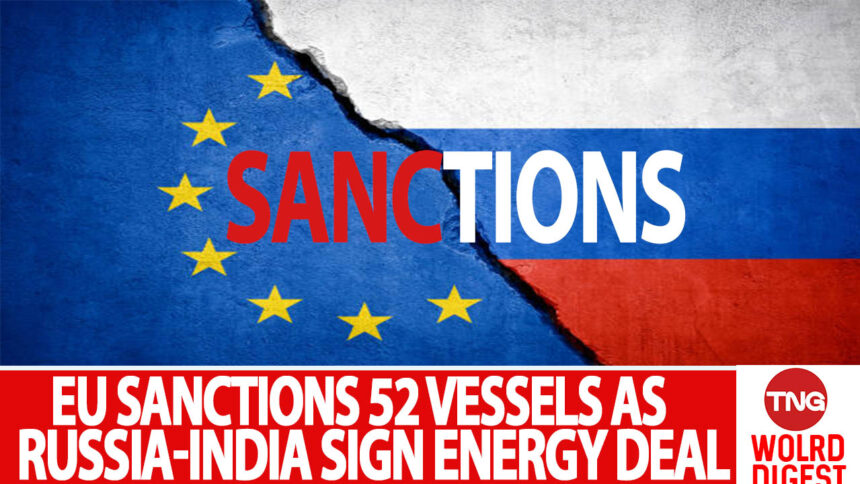The European Union has imposed sanctions on 52 vessels, including tankers, cargo ships, and other vessels, in its latest effort to crack down on Russia’s “shadow fleet” and curb its ability to circumvent economic sanctions. These ships were found to be engaged in high-risk shipping practices, transporting Russian oil or petroleum products, arms deliveries, grain theft, or supporting the Russian energy sector.
The sanction on Monday, December 16, included sanctions on dozens of officials linked to Russia’s war on Ukraine, including two top North Korean defense officials, a military unit blamed for an attack on a Kyiv children’s hospital, and the heads of companies in the energy sector.
The 52 sanctioned ships are part of the EU’s 15th package of sanctions, targeting the largest listing of vessels to date. The blacklisted ships are now subject to a port access ban and a ban on provision of services, including insurance, financing, and repair. The EU’s targeted approach aims to increase the cost for Russia to use such vessels and weaken its war machine. The sanctions package also imposes fully fledged sanctions on various Chinese actors supplying dual-use goods in support of Russia’s war of aggression against Ukraine. The EU has now sanctioned a total of 79 vessels.
In a statement, EU foreign policy chief Kaja Kallas highlighted that the sanctions are a response to weakening Russia’s war machine.
Kaja Kallas said, and I read: “This package of sanctions is part of our response to weaken Russia’s war machine and those who are enabling this war, also including Chinese companies. We will stand by the Ukrainian people on all fronts: humanitarian, economic, political, diplomatic, and military.”
In total, EU foreign ministers froze the assets of 54 individuals and 30 “entities,” which are typically companies, ministries, government agencies, or other organizations. Officials were also subject to travel bans.
While The EU and US are busy imposing economic sanctions on Russia and its allies, Russia and India have signed the largest-ever energy deal, with Russian state-owned oil firm Rosneft agreeing to supply 500,000 barrels of crude oil per day to Indian private refiner Reliance. The 10-year agreement is worth roughly $13 billion a year at current prices, accounting for 0.5% of global supply.
Under the ten-year agreement, Rosneft would deliver 20-21 Aframax-sized cargoes (80,000 to 100,000 metric tons) of various Russian crude grades plus three cargoes of about 100,000 tons each of fuel oil each month. The majority of the supply will be medium-sulphur and diesel-rich Russian Urals, priced at a discount of $3 per barrel to Dubai quotes for the following year.
Moscow’s ambassador to the country, Denis Alipov, said this week that Russia has become the largest oil supplier to India, accounting for up to 40% of the Asian nation’s overall crude imports. Deliveries have doubled last year to $45 billion, he added.
This deal solidifies Russian-Indian cooperation and could cause friction among OPEC+ members as Russia encroaches on Gulf producers’ market share in India. The partnership faces risks from growing US, UK, and EU sanctions, which are intensifying against Russian clients like India and China and may impact Russia’s Arctic LNG operations.
“















